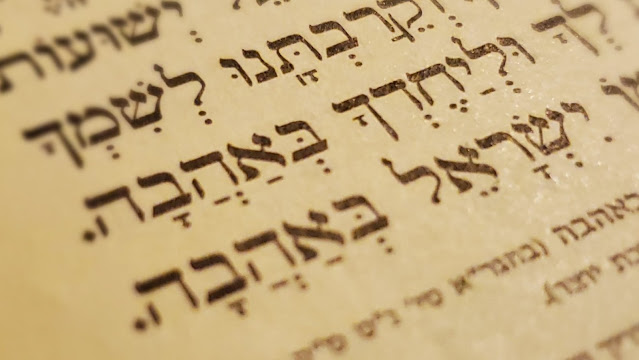This week's Torah content is sponsored by a generous donor who wishes to remain anonymous, and told me, "No thanks needed!" so I'm not going to thank them.
Click here for a one-page printer-friendly version of this article, and click here for an audio version.
“Hear, O Israel, Hashem is our God, Hashem is One” (Devarim 6:4). This pasuk is the source of the mitzvah of Yichud Hashem (God’s Oneness). We are commanded to “unify” Hashem in our minds: to know that He is Absolutely One in every sense of the term, and to continually strip away all notions of contingency, multiplicity, physicality, and temporality from our conception of Him (Hilchos Yesodei ha’Torah 1:7-12).
“You shall love Hashem, your God, with all your heart, with all your soul, and with all your resources” (Devarim 6:5). We are also commanded in the mitzvah of ahavas Hashem (love of God): to contemplate the infinite wisdom in His wondrous creations, which will result in a state of bliss (Sefer ha’Mitzvos: Aseh #3) and fill us with an overpowering desire to seek even more knowledge of Him (Hilchos Yesodei ha’Torah 2:2).
Yichud Hashem is logically prior to Ahavas Hashem. After all, how could a person have “a tremendous desire to know the great Name” (ibid.) without knowledge of who Hashem is (and who He is not)? Indeed, the Rambam explains that ahavas Hashem “is based entirely on knowledge, and the love will be in proportion to the knowledge: if little then little, if a lot then a lot” (Hilchos Teshuvah 10:6).
However, in his commentary on Ahavah Rabbah / Ahavas Olam – the berachah which we say in Shacharis before the Shema – the Abudirham indicates that ahavas Hashem is, in another sense, prior to Yichud Hashem:
You will find that this berachah includes many themes: that Hashem loves us more than all the other nations, that He gave us the Torah, that He instilled within us belief in His Oneness, and that He is the Lord of all – but the berachah concludes with [the theme of] love, not with [the theme of] Oneness, because the declaration of His Oneness is ineffective (lo yo’eel) unless it is from love and from a whole heart.
What does this mean? Presumably, the Abudirham would agree that there is inherent value in knowing Yichud Hashem, both because it is a fundamental truth and because such knowledge is a mitzvah. The Torah’s value system of avodah me’ahavah (serving Hashem out of love) and Torah lishmah (learning Torah for its own sake) is predicated on the idea that knowledge is intrinsically valuable, as the Rambam writes: “the only purpose of truth is to know that it is true” (Intro to Perek Chelek). What, then, is the Abudirham referring to when he speaks of the “efficacy” of our declaration of Yichud Hashem? “Effective” in what sense? And what makes a “loveless” proclamation of His Oneness “ineffective”?
According to the Abudirham, it is our declaration of Yichud Hashem that has a purpose beyond merely reviewing the idea. Ahavas Hashem is the motion of the yearning soul in its quest for knowledge of reality. Yichud Hashem is the (ultimately) unattainable destination of that quest. When we affirm our belief in Yichud Hashem from a place of ahavah, we strengthen our
conviction that behind this multifaceted reality is a Unity. In other words, a “wholehearted”
Shema will have the beneficial effect of reinforcing the synergistic
relationship between Yichud Hashem and ahavas Hashem. But if God’s
Oneness is nothing but an abstract theoretical construct which resides in our
intellect, disconnected from our passionate truth-seeking, then our declaration
of Yichud Hashem is reduced to a dry, ritualistic, “ineffective” catechism.
Now
we can understand what we mean at the end of this berachah when we ask
Hashem to help us “yachedecha be’ahavah” (lit. “to unify You in love”). We
are asking that our conviction in His Oneness not only inform but also enflame
our quest for knowledge, and that our seeking of truth be oriented towards the
ultimate Truth. The conclusion of the berachah teaches us that Hashem’s love
towards us is based on our love towards Him.
______________________________
If you've gained from what you've learned here, please consider contributing to my Patreon at www.patreon.com/
If you would like to sponsor an article, shiur, or podcast episode, or if you are interested in enlisting my services as a teacher or tutor, you can reach me at rabbischneeweiss at gmail.com. Thank you to my listeners for listening, thank you to my readers for reading, and thank you to my supporters for supporting my efforts to make Torah ideas available and accessible to everyone.
Be sure to check out my YouTube channel and my podcasts: "The Mishlei Podcast", "The Stoic Jew" Podcast, "Rambam Bekius" Podcast, "Machshavah Lab" Podcast, "The Tefilah Podcast" For the full guide to all of my Torah content, click here.

No comments:
Post a Comment